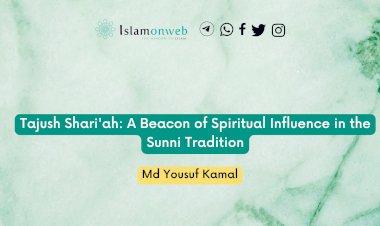Ahmad Sirhindi: A Spiritual Revivalist of Islamic Thought
Aḥmad al-Fārūqī al-Sirhindī, also known as Mujaddid Alf-e Sāni, was a famous Islamic scholar and Sufi mystic. He was born in 1564 in Sirhind, Punjab, India. During the 17th century, he became very important in making Islam stronger and better again. Because of this, he got the title "Mujaddid," which means someone who renews and revitalizes the faith.
Sheikh Ahmad Sirhindi hailed from a scholarly family deeply rooted in islamic knowledge. He studied different branches of Islam, including the Quran, hadith, jurisprudence and spirituality. For having a very exceptional spiritual approach towards Islamic thought, he is considered to be a prominent figure in reviving and revitalizing Islam in both ways, spiritually and intellectually.
Educational Career & Literary Works
Ahmad al-Fārūqī al-Sirhindī was born on 26 June 1564 CE (971 AH) in the town of Sirhind, present-day Punjab, India. From an early age, Sirhindī displayed exceptional intellectual abilities and a strong inclination towards religious studies. His elementary education was from his father Shaykh 'Abd al-Ahad, who was a renowned scholar. He studied various matters about Islam and became fond of Islamic teachings, followed by his interest in understanding the spiritual mystery of Islam.
In his youth, Sirhindī witnessed the challenges faced by the Muslim community in India due to political turmoil and the religious policies of Emperor Akbar. Akbar's attempts to blend different religions into a new one, called Dīn-e Ilāhi, posed a threat to traditional Islam. Sirhindī became a prominent advocate for preserving pure Islamic teachings and defending the Islamic law (Shari'a). He strongly opposed the mixing of Islamic beliefs with other religions and philosophical ideas.
Throughout his life, Sirhindī wrote many books about different subjects. He wrote about Islamic beliefs, Sufism (Islamic mysticism), laws, morals, and more. Some of his famous works include "Maktubat" (Letters), which is a collection of his spiritual letters, and "Khutbat-e-Mujaddidiya" (Sermons of the Mujaddid), containing his speeches and talks.
Sirhindī's concept of mujaddid gained significant recognition and acceptance among Muslims. He believed that at the beginning of every century, a mujaddid, or renewer, would appear to revitalize Islamic teachings and reform the Muslim community. Sirhindī saw himself as the mujaddid of the second millennium (Alf-e Sāni) and worked diligently to fulfill this role. His teachings and ideas attracted a large following, and his influence spread beyond India.
Ahmad al-Fārūqī al-Sirhindī, Mujaddid Alf-e Sāni, passed away on 28 December 1624 CE (1034 AH) in Sirhind, leaving behind a lasting legacy in Islamic thought and spirituality. In fact, the contributions he has made in Islamic scholarship defending the orthodox practices and reviving Sufism has still been continuing to inspire and shape the understanding of Islam among Muslims.
Reforms in islamic thoughts
Ahmad Sirhindi made significant contributions to both Sufism and philosophy, leaving a profound impact on these fields. His reforms within Sufism emphasized adherence to Islamic orthodoxy and the importance of spiritual guides, while his philosophical works explored profound concepts concerning existence and the relationship between the Creator and the created.
Ahmad Sirhindi's contributions to Sufism helped shape the development of the tradition by emphasizing the integration of Islamic teachings with mystical practices. His emphasis on Islamic orthodoxy safeguarded Sufism from straying away from its foundational principles, while his endorsement of spiritual guides nurtured a structured and authentic path to spiritual growth. In the realm of philosophy, Ahmad Sirhindi's inquiries into the nature of existence and the concept of unity laid the groundwork for exploring metaphysical and epistemological questions, leaving an enduring impact on Islamic philosophical thought. Through his pioneering ideas in both Sufism and philosophy, Ahmad Sirhindi continues to be remembered as a distinguished scholar whose intellectual legacy endures through the centuries.
Sirhindī made significant contributions to Islamic thought in various areas. Some Important of his Contributions:
Concept of Mujaddid: Sirhindī introduced the concept of mujaddid, which refers to a reviver or renewer of Islam who appears at the turn of every century according to some interpretations. He saw the role of the mujaddid as essential in preserving the teachings and spirit of Islam and reviving the Muslim community.
Revival of Sufism: Sirhindī played a crucial role in the revitalization of Sufism during his time. He emphasized the importance of spiritual purification, devotion, and the inner dimensions of Islam. Adding value to this approach, the teachings he has given with his writings and sermons had a significant impact on the Sufi order in India and beyond.
Unity of Being (Wahdat al-Wujūd): Sirhindī is known for his theological concept of "Unity of Being," also known as Wahdat al-Wujud. According to this concept, all existence is ultimately a manifestation of the divine essence. This idea had influenced a huge margin of Sufi thinkers and poets of his time, including even the renowned poet and philosopher Rumi.
Defense of Sharia and Orthodoxy: Sirhindī strongly believed in following the traditional Islamic beliefs and obeying the Sharia (Islamic law). He criticized the practices that were based on beliefs not in line with Islam or the Muslim community. All he wanted to to do was to uphold the teachings of the Messenger of Allah ﷺ and hand it over to the next generation without losing its values and essence.
Condemnation of Sufism
It's important to note that Ahmad Sirhindī wasn't a critic or condemner of Sufism as a whole. In fact, he was considered to be an exemplary Sufi who had played a significant role in the revival of Sufism. Still, it's true that Sirhindī was critical of certain aspects of Sufism that he believed swerved from the training of Islam or led to syncretism with other religious or philosophical beliefs. His opposition was primarily directed towards those Sufis, who, in their view, compromised the orthodox beliefs and practices of Islam. Sirhindī emphasized the significance of clinging to the training and teaching of the Messenger of Allah ﷺ and the agreement of the scholarly tradition.
He was concerned about the eventuality for spiritual practices and beliefs within Sufism to slapdash from the elementary principles of Islam. His theological conception of ''Unity of Being" (Wahdat al-Wujūd), while embraced by some Sufis, also attracted review from other scholars who believed it could lead to pantheistic interpretations. Sirhindī himself approached this conception from a perspective that emphasized the better quality and suitable arrangement of God but also stressed the distinction between the Creator and the created.
His followers carried forward his spiritual heritage, and his annotations regarding Sufism and spirituality were extensively circulated and studied. Ahmad Sirhindi's emphasis on Islamic fallacy and his part as a leftist within the Naqshbandi Sufi order contributed to shaping the religious geography of India during his time and posterior centuries. His ideologies were groundbreaking in helping out the Deobandi movement, which later on became a significant revivalist movement that emerged in the 19th century.
Legacy
The death of Ahmad Sirhindi marked the end of his physical presence, but his intellectual and spiritual benefactions have continued to impact religious scholars, Sufis, and votaries of the Naqshbandi order to this day. Ahmad Sirhindi was a largely influential Islamic scholar and Sufi who lived during the Mughal Empire in India. He focused on making Islamic practices pure and strong, and he stressed the importance of following religious rules and being devoted to spirituality. Many people liked and followed his teachings because of this. These initiatives left an underlying effect, especially in the Naqshbandi Sufi order. Even though he passed away in 1624, Sirhindi's teachings are still studied and respected by scholars, Sufis, and followers of the Naqshbandi order and would be a beacon of spirituality and Sufism for the generations to come.
Reference
https://en.islamonweb.net/imam-a%E1%B8%A5mad-raza-al-qadri-the-islamic-polymath-of-14 th-century-ah
"The Naqshbandiyya: Orthodoxy and Activism in a Worldwide Sufi Tradition" by Itzchak Weisman.
"Sufi Saints and State Power: The Pirs of Sind, 1843-1947" by Sarah F. D. Ansari.
"The Sufi Orders in Islam" by J. Spencer Trimingham.
"Islamic Mysticism: A Short History" by Alexander Knysh.
"The Oxford Encyclopedia of Sufism" edited by John L. Esposito.
"Islamic Revival in British India: Deoband, 1860-1900" by Barbara Daly Metcalf.
"The Emergence of Modern Southeast Asia: A New History" by Norman G. Owen.
History of Islam/volume-ii/prof. Masudul Hasan.
About the author
Alamin Sk is a senior secondary final year student of Darul Huda Islamic University,West Bengal Campus. He is interested in history, current muslim world, Islamic theology, Ṣūfism and Islamic history.
Disclaimer
The views expressed in this article are the author’s own and do not necessarily mirror Islamonweb’s editorial stance.

























Leave A Comment